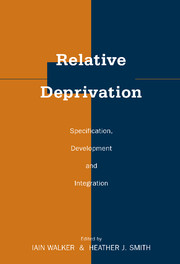Book contents
- Frontmatter
- Contents
- List of Contributors
- 1 Fifty Years of Relative Deprivation Research
- PART ONE SPECIFICATION
- PART TWO DEVELOPMENT
- PART THREE INTEGRATION
- 11 Social Identity and Relative Deprivation
- 12 Relative Deprivation and Counterfactual Thinking
- 13 Relative Deprivation and Attribution: From Grievance to Action
- 14 Spontaneous Temporal and Social Comparisons in Children's Conflict Narratives
- 15 Prejudice as Intergroup Emotion: Integrating Relative Deprivation and Social Comparison Explanations of Prejudice
- Part Four Conclusion
- Index
12 - Relative Deprivation and Counterfactual Thinking
Published online by Cambridge University Press: 29 September 2009
- Frontmatter
- Contents
- List of Contributors
- 1 Fifty Years of Relative Deprivation Research
- PART ONE SPECIFICATION
- PART TWO DEVELOPMENT
- PART THREE INTEGRATION
- 11 Social Identity and Relative Deprivation
- 12 Relative Deprivation and Counterfactual Thinking
- 13 Relative Deprivation and Attribution: From Grievance to Action
- 14 Spontaneous Temporal and Social Comparisons in Children's Conflict Narratives
- 15 Prejudice as Intergroup Emotion: Integrating Relative Deprivation and Social Comparison Explanations of Prejudice
- Part Four Conclusion
- Index
Summary
The specific phenomenon that has been the principal stimulant of research on relative deprivation is the frequent discontinuity between objective and subjective well-being. Individuals' objective conditions (wealth, health, etc.) are, at best, imperfect predictors of their subjective satisfaction with their lives or situations. The insight provided by the construct of relative deprivation is that people evaluate their outcomes in relation to standards; when their outcomes fall below the standards, they feel “deprived.” Thus, feelings of deprivation are relative; that is, they imply a comparison with a standard.
Most sociologists and psychologists who have studied relative deprivation have focused on one particular type of comparison standard, namely, the outcomes of other people. That is, social comparisons have constituted the central mechanism hypothesized to underlie the occurrence of relative deprivation (see Olson, Herman, & Zanna, 1986). For example, in the most influential model of personal relative deprivation, Crosby (1976) proposed that one necessary precondition of relative deprivation is the perception that another person possesses a desired object.
Of course, other people's outcomes provide only one of many possible standards with which one's own outcomes could potentially be compared. For example, individuals could compare their current outcomes with their own outcomes in the past. Such temporal comparisons might yield dissatisfaction if past outcomes exceed current ones. Indeed, Gurr (1970) used the term decremental deprivation to refer to this situation, where decreasing outcomes over time yield anger.
- Type
- Chapter
- Information
- Relative DeprivationSpecification, Development, and Integration, pp. 265 - 287Publisher: Cambridge University PressPrint publication year: 2001
- 3
- Cited by

